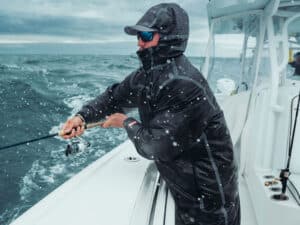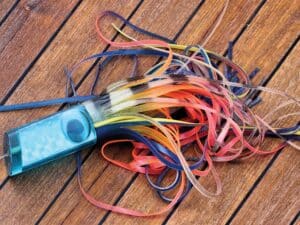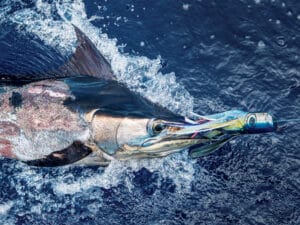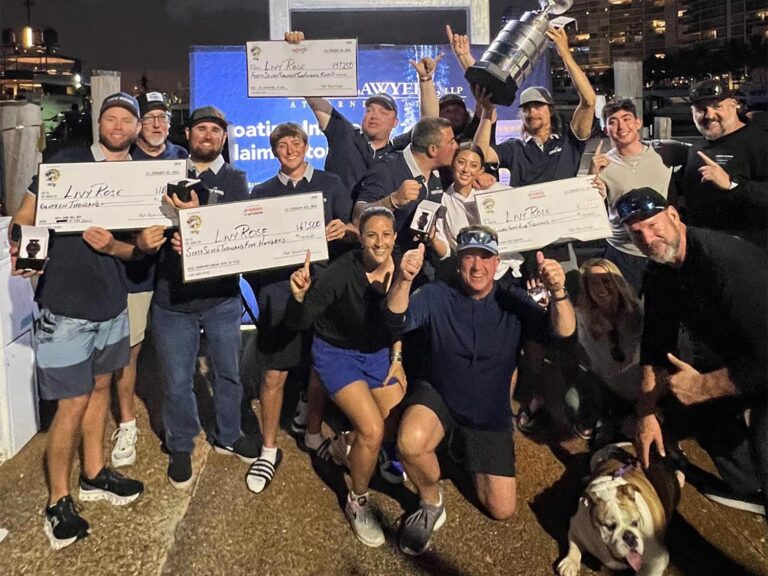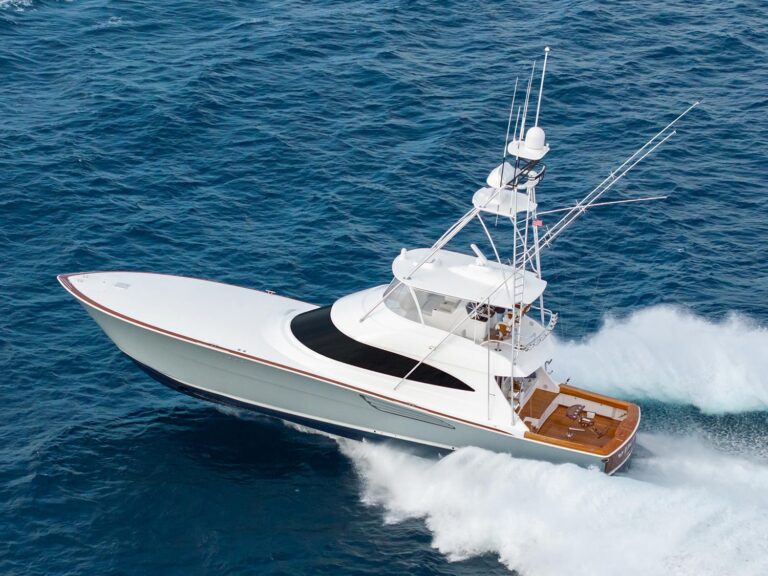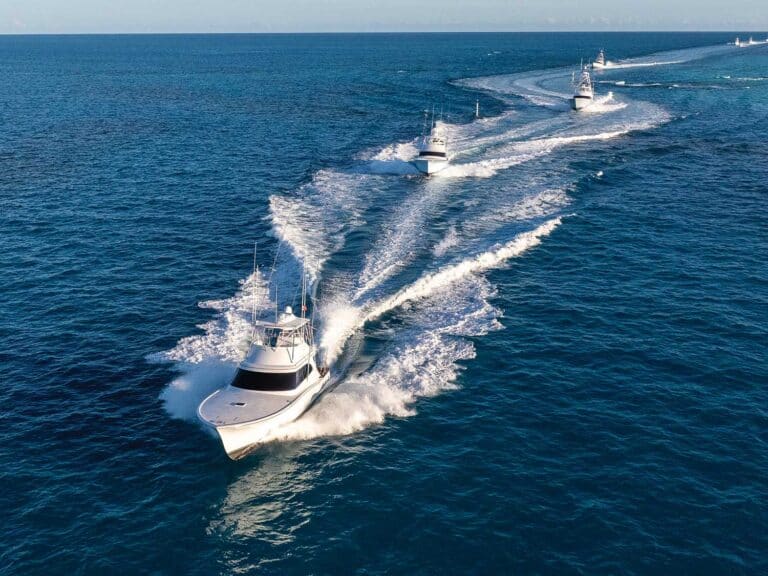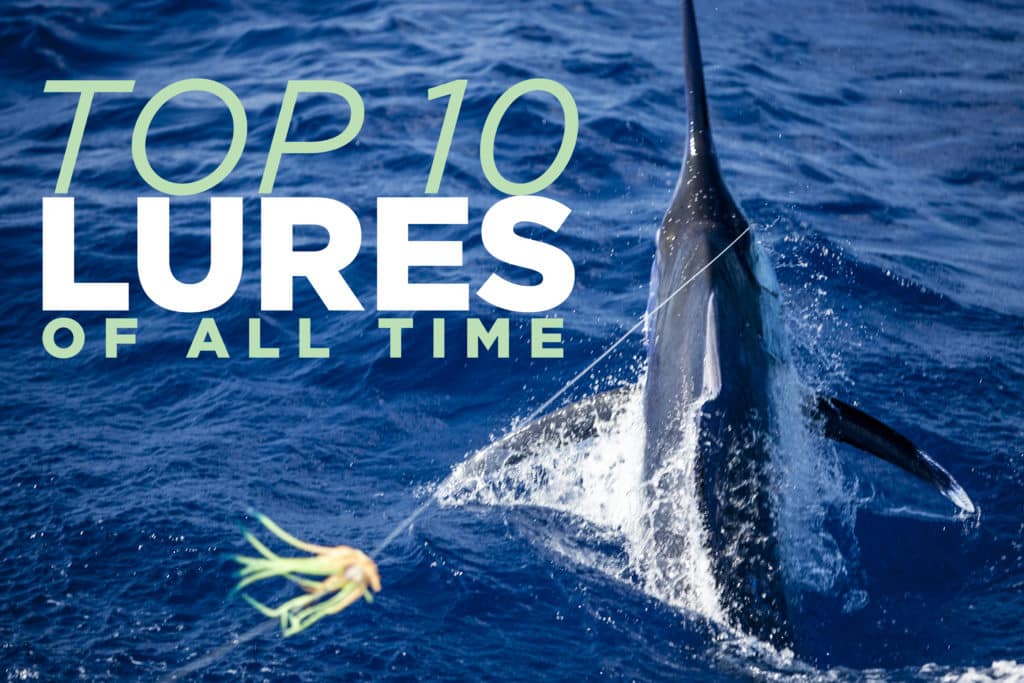
The Top Ten Lures of All Time
Nothing makes an offshore angler’s blood boil more than a disparaging comment attacking the lures he’s pulling. I got set up like a bowling pin when I joined a table full of lure manufactures at the Clevelander bar during the Miami International Boat Show one year. Capt. Jeremiah Nachtigal asked me what my favorite lures were while sitting across from the famous Hawaiian lure makers Bomboy Llanes and Marlin Parker. The Jack Daniels told me that the best course of action would be to piss the whole table off, so I blurted out, “They’re all the same, and I could whip anybody’s butt with four black Wide Ranges.”
The ensuing silence seemed to last for an hour, but I’m sure it was only seconds before Nachtigal waded in and saved my sorry butt with the quip, “He’s been hanging around Peter Wright too much, eh, fellas?” The resulting laughter told me I was forgiven for my East Coast ignorance, and the night proceeded without a pummeling.
Instead of asking just the top captains to put together a top ten lure article, we turned to the general population of offshore anglers and asked them their favorites. We posted the question on our website, in our newsletter and through several e-mail blasts, encouraging anglers to pass it on and reply. I love to get you boys talking, and this is the list that we compiled.
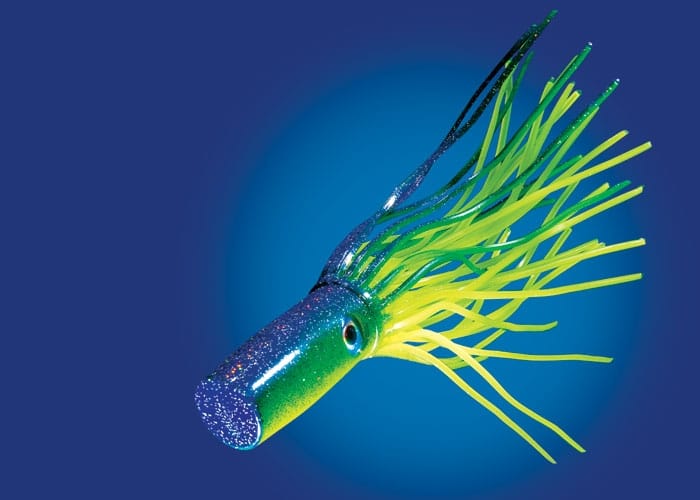
Mold Craft Wide Range
One of the original Mold Craft lures, the Wide Range (pictured above) came to Frank Johnson through the suggestions of Capt. Peter Wright in 1977. Wright and Hawaiian Capt. Jeff Fay were experimenting with lures made out of rolls of sheet rubber while working together on Humdinger in the mid-’70s. Wright showed his prototypes to Johnson during a charter, and they struck a deal on the spot to make the lures.
The lure gets its name from the “wide range” of speeds and conditions through which the lure can be pulled. “It’s definitely the lure of choice for rough water,” says Johnson. “With its squared-off nose and center hole, the Wide Range stays stable in almost any conditions.”
This lure showed up in a vast majority of the responses, and all the big names seem to pull at least one Wide Range in the spread. On almost every boat I board, no matter where I am in the world, I’ll usually find a Mold Craft Wide Range. One of my favorite testimonials came from a Richard McAdams, who fishes the Gulf of Mexico: “If I could pick only one marlin lure to fish with anywhere in the world, it would be a purple/silver/black Mold Craft Senior Wide Range. This lure gets the most vicious strikes I have ever seen. I can put it on the flat line or short ‘rigger, and it runs like a champ in all seas. I fish the northern Gulf of Mexico where the seas can jump from 3 feet to 6 feet in a matter of minutes, but this lure catches fish no matter how rough it gets. It runs well with either a single- or double-hook rig and is pretty much idiot-proof, which makes it the perfect lure for me!”
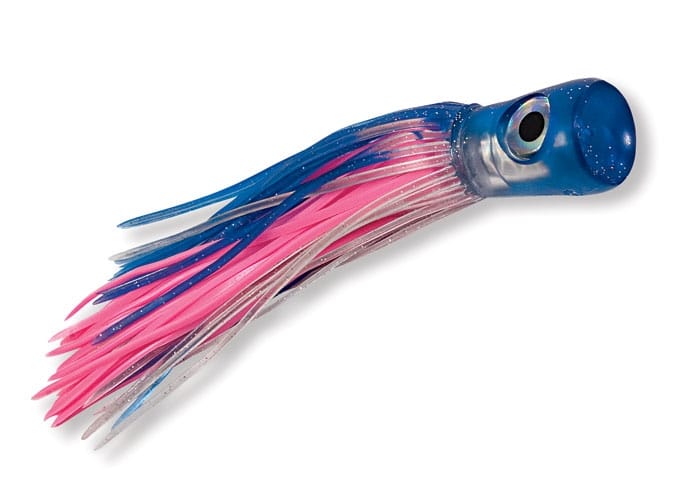
Mold Craft Super Chugger
Traveling angler and freelance writer Tony Pena, whose work you often see here in Marlin, can’t say enough about the Mold Craft Super Chugger – and he has plenty of company. “My vote goes to the Mold Craft Super Chugger (8 1/4 inches in blue/white/yellow combo). I’ve caught blue, black and striped marlin, Pacific sailfish and numerous other species, such as 300-pound yellowfin tuna, on this lure. It works bigger than its size and is truly a universal lure, producing great results from Thailand to Panama.”
The concave face of the Super Chugger allows the lure to come and grab a gulp of air and let it out in a thick bubble stream with a short side-to-side wiggle of its head. It rises and falls with a surprising regularity that seems to drive blue marlin crazy. The lure’s face causes it to pull hard through the water, but it still remains stable in rough water. “It works well at a wide range of speeds as well,” says Frank Johnson Jr. “You can pull anywhere from 5 to 12 knots, but it works best at the lower end of that range.”
Paulo Amorim’s 1,402-pound, all-tackle Atlantic blue marlin ate a pink-and-white Super Chugger off Vitoria, Brazil, in 1992, sealing the lure’s status in big-game-fishing history.

Pakula Lumo Sprocket
While fishing in the USVI Open/Atlantic Blue Marlin Tournament on Poli-Sea, I saw first mate Jody Wentworth jump overboard to retrieve a lure that had just caught a 500-pound blue and fallen into the water. As usual, there were big sharks in the area attracted to the struggles of the marlin, but Wentworth, determined not to lose his last Pakula with two days of fishing left in the tournament, swam down around 20 feet to retrieve the sinking lure.
“Peter Pakula’s cup-nosed creations are relatively unknown in California, but they have been a well-kept secret of many crews for the past 15 years,” says Greg Stotesbury of AFTCO. “I have several vintage Pakulas aboard Kawakawa that look like they were trolled over asphalt from all the bill and teeth marks in the resin heads!”
Peter Pakula started making his lures in his native Australia in 1976, but his first lures went to Hawaii, and he didn’t start to sell them in Australia until 1980. Designed as a straight runner with very tight swimming action, the Lumo Sprocket works well in any position but runs best in the long outrigger slot.
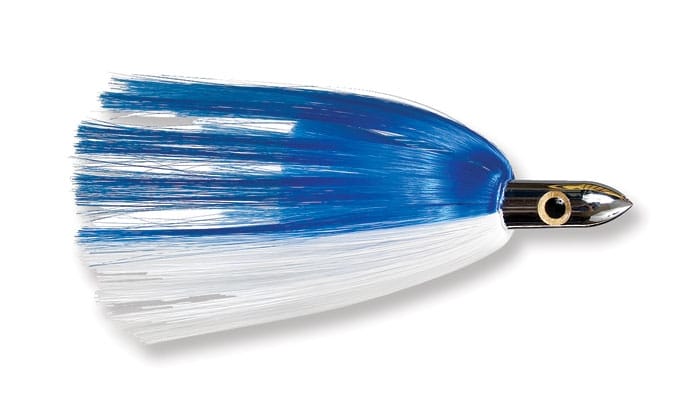
Tournament Tackle’s Ilander Lure or Hawaiian Eye
The legendary Ilander, or “Hawaiian Eye” as some of you still know it, has probably caught twice as many blue marlin on the Atlantic Coast as its nearest competitor. The Ilander is another one of those lures that you’re apt to find on board in even the most remote fishing holes on earth.
Developed by Jim Kress in 1976, the lure was initially named the Hawaiian Eye and was designed to troll at high speeds on the way out to the fishing grounds. The Ilander accounted for several innovations that can be found on many lures today: It was the first true high-speed trolling lure, the first to have permanent nylon skirts and the first to use realistic eyes.
Versatility (along with tremendous productivity) probably accounts for most of the Ilander’s success. Anglers like John Lavelle of Cape May, New Jersey, reach for the Ilander no matter what species of marlin they’re chasing. “I know you’re going to hear from a lot of captains on the East Coast who never leave the dock without a trusty supply of blue/white Ilanders with some meat behind them,” says Lavelle. “Besides a naked ballyhoo, the blue/white Ilanders are the bait of choice for white marlin on the East Coast.”

Copa Fishing Lures’ Tado
Not only did Steve Coggin’s Tado get a lot of votes, but the pleas for recognition usually came with a picture of a huge blue marlin with a Tado hanging out of its face! (It was also the only lure that got a vote from the maker’s wife, but don’t worry, fellas, I didn’t count it!)
I first became aware of Coggin’s lures while interviewing him for a story written by Jim Rizzuto called “Jewels in the Spread” (June/July 2003) for some filler material. His beautiful, big lures looked more like works of art than something you’d fish. He makes all of his lures by hand and still uses real shell inserts.
“Tado is a big lure, and it runs great on the short corner,” says Coggin. “I first started making it during the late ’70s and early ’80s at a time when most guys were making smaller lures. I gave one to Chip Van Mols on Jen Ken Po, and he caught a 700-pounder on it. He promptly named the lure Tado, which is short for the Hawaiian name (Kona slang actually) for skipjack over 10 pounds, ‘otado.'”
The big Tado bait secured its reputation in Kona by catching a 1,197-pound blue during the 1993 Lahaina Jackpot for the boys on Cormorant, which held the spot for the largest tournament fish ever caught for several years running.

Joe Yee Super Plunger
Although Bart Miller and Gene Vander Hoek are widely credited with coming up with the first plunger, they weren’t the ones to bring popularity to the shape. “Joe Yee’s Super Plunger is probably the most famous and widely used plunger,” says Tracy Melton of Melton International Tackle. “We’ve been selling them since 1994, and in my opinion, there’s only one super plunger, and it’s handmade by Joe Yee. I think he’s got 12 or 13 granders on that lure, including the current 50-pound record Pacific blue marlin weighing 1,166-pounds caught off Kona.”
But the Joe Yee Super Plunger also performs well in the Atlantic. “It’s a great big fish lure, and a lot of guys pull them in Bermuda. Some Bermudian fellow came over to Kona and caught a grander on one and took a boatload back home with him. The Pink Pearl Super Plunger is the one everybody wants,” says Melton.
Joe Yee still makes every Super Plunger in his basement in Kona. “Capt. Peter Hoogs on Pamela asked me to make a plunger for him,” says Yee. “Capt. Gene Vander Hoek was making them and doing real good. But I didn’t know what a plunger was. So I made up a big lure for Hoogs, and he went out and caught a 500-pounder on it. And since Gene’s was a 12-inch lure, and mine was more like 14, Hoogs called it a Super Plunger, and the name stuck.
“A lot of people have caught big fish on that lure,” Yee continues. “One day I was eating dinner with a group that was going charter fishing the next day, and I ended up telling the lady that she was going to catch a grander – just kidding, you know. I went to my room and brought her back a Super Plunger and told her to catch a big one. The next day, I was having lunch near the docks and heard that Jen Ken Po had a big one on. Sure enough, it was that same lady, and she ended up catching a 1,183-pound blue.”

Marlin Magic Ruckus
Another overwhelming favorite, the Marlin Magic Ruckus, worked its way into the spread of a large number of big-fish captains, falling just behind the Wide Range in overall popularity. Capt. Marlin Parker has been making lures for more than 20 years, and the Marlin Magic Ruckus was one of his first designs.
“I came up with Ruckus after chopping down a much larger head and shaving down the nose,” says Parker. “The resulting shape carries a lot of air down on the dive, and it looks like a white explosion as it releases the air underwater. That’s why we named it Ruckus.
“The Ruckus has a softer slant, so its one of the easier of my lures to rig and run,” he continues. “It’s highly productive and one of my best tournament lures. I’ve won more tournaments on the ruckus than any other lure, including the Bisbee Black and Blue in 2004 and the World Cup in 2002. The lure goes off in any position, and if you match the hatch, you should do well. If there’s a lot of skipjack around, pull a purple/black; if there are more mackerel, pull one with some green and blue. Last year we even had a run where the pure black was just incredible.”
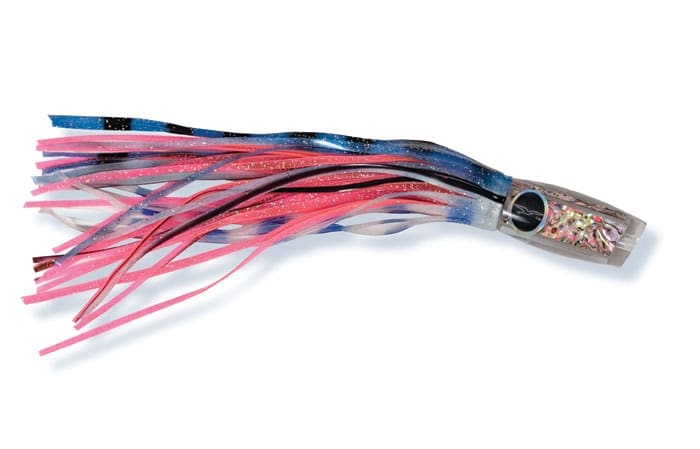
Black Bart 1656
This one really surprised me. I was pretty sure at least one of Bart Miller’s lures would make the list; however, I just figured it would be one of his ever-popular styles like the Breakfast or Grander Candy. Instead, the smaller-size 1656 Angle pulled ahead of its big brothers in the voting.
“That’s the shape I used to catch the 1,656-pound blue marlin, only it was a much bigger head than the one we sell now,” says Miller. “I sized it down a bit because most people don’t pull 130-pound line. With the smaller head, you can use 50 or 80 and pull it fine.”
Miller attributes the lure’s success to its versatility. “It really takes a variety of good lure features and wraps them into one shape. It has an easy entry that allows it to run well in all conditions, it doesn’t have a radical slant so it stays in the water, and its 12-inch size elicits a lot of strikes from different species,” he says. “A slight reverse taper gives the lure a nice wiggle but doesn’t make the lure change its course, so it has a really high hookup ratio. I make a whole line of them ranging in size from a 9-inch up to the Braziliano, which is actually closer to the size of the one that caught the 1,656. We also make the 1656 with a flat nose. I’ve gotten a lot of mileage out of that shape.”
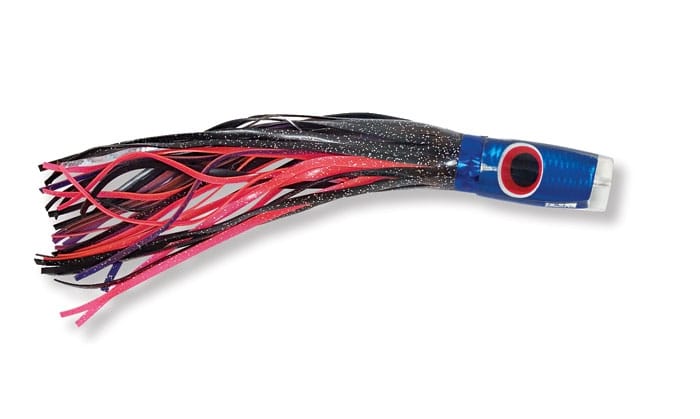
Bob Schneider Yap
Bob Schneider of Lake Park, Florida, used his stint in the U.S. Navy as a way to test and design lure shapes way back in the late ’50s. He started by raiding the ship’s chandlery for pieces of wood that he could whittle down to lure heads.
“I’d fish the lures with a hand line off the fantail of the destroyer, and when one started catching fish, I’d name it for whatever island group we were closest to. That’s how the Yap got its name. It’s named for the Yap Islands near the Marianas Trench,” says Schneider.
Schneider got a copyright on his Yaps, making them one of the first offshore lures to be patented. With its blunt nose and slightly off-center hole, the meandering and quivering Yap still holds the Florida state record with a 981-pound blue caught off Destin by Warren Culverson on Dixie Darling. Capt. Allen Sizle, who now resides in Birmingham, Alabama, was one of many who recounted great early success with Schneider’s Yap. “One day during the early ’80s, when everybody else was pulling bait in the Bahamas, we decided to try pulling some lures while fishing out off Chub Cay. For three days, we screamed around pulling lures and caught 10 blues, two sails and three whites almost all on the same lure: Bob Schneider’s Yap. The first time we ever pulled it, we missed three blue marlin because we didn’t know what we were doing. On one of those three days, the Yap caught a 535-pound blue, two whites and a sail.”
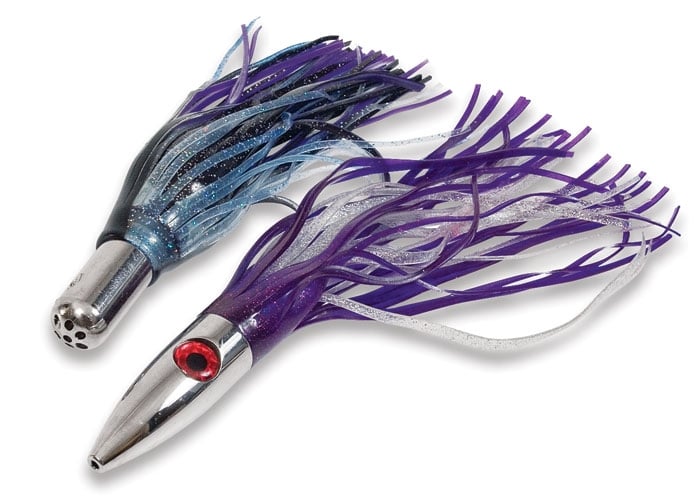
Any small jet or bullet on the shotgun
A large majority of anglers like to pull a jet or bullet-shaped lure on the shotgun. Almost everyone who makes a jet was represented in the sampling, with no one manufacturer coming out a clear winner which pretty much sums up Capt. Peter B. Wright’s third favorite choice: “Any brand of conical, symmetrical, metal jet head has caught more 1,000-pound-plus blue marlin than any other lure.” And here’s my theory on why: Because everybody in Hawaii is pulling one on the shotgun trying to catch a tuna! When the majority of crews are pulling the same style lure, in mostly the same position, in one of the premier big blue marlin destinations, it’s going to get eaten a lot.
And since the fish doesn’t have to pluck the lure off the water’s surface and can catch it with relative ease, the hookup percentage of the heavy lure is going to be pretty darn good. While you hear a lot of claims about jets whistling like wounded squid or creating bubbles through the jet holes, I think a jet or bullet-headed lure’s main advantage lies in its relatively small size and lack of a side-to-side motion. Bart Miller insists that his Black Bart Pro Jet is the best jet ever and the only one of his lures that never comes out of the spread, and I’m not going to argue with him.
The 10 Best Marlin Lures
- Mold Craft Wide Range
- Mold Craft Super Chugger
- Pakula Lumo Sprocket
- Tournament Tackle Ilander Lure
- Copa Fishing Lures Tado
- Joe Yee Super Plunger
- Marlin Magic Ruckus
- Black Bart 1656
- Bob Schneider Yap
- Any small jet or bullet on the shotgun
